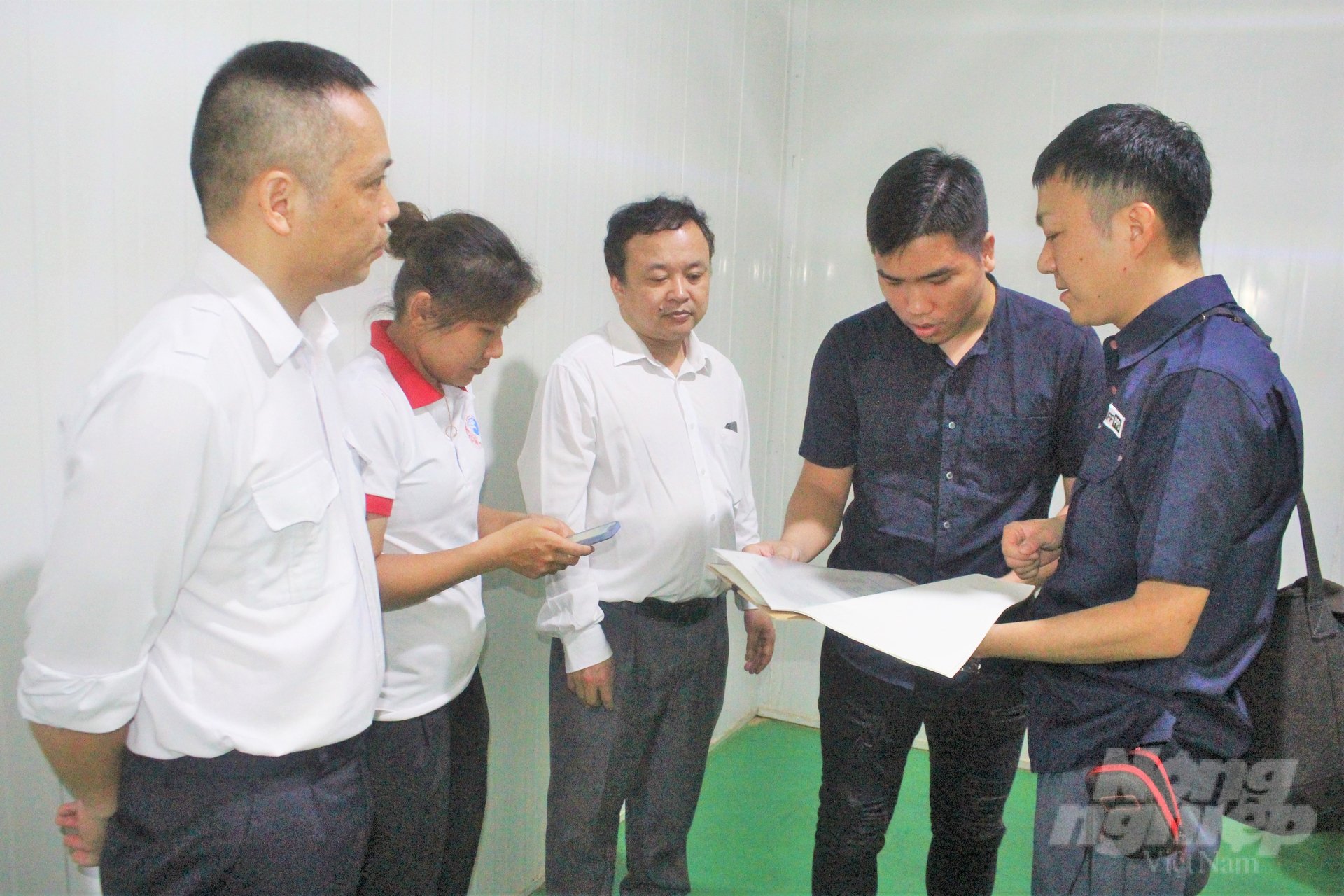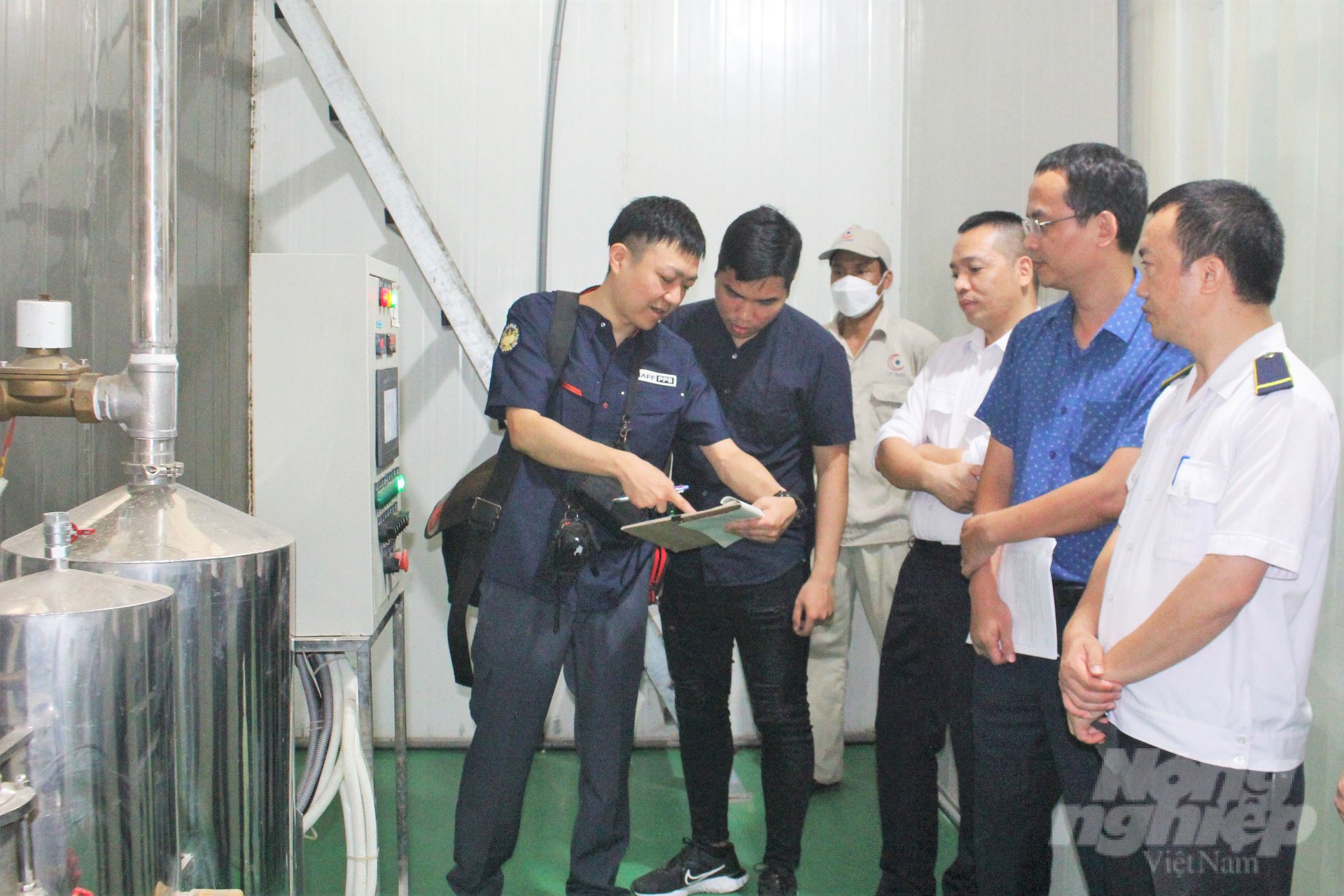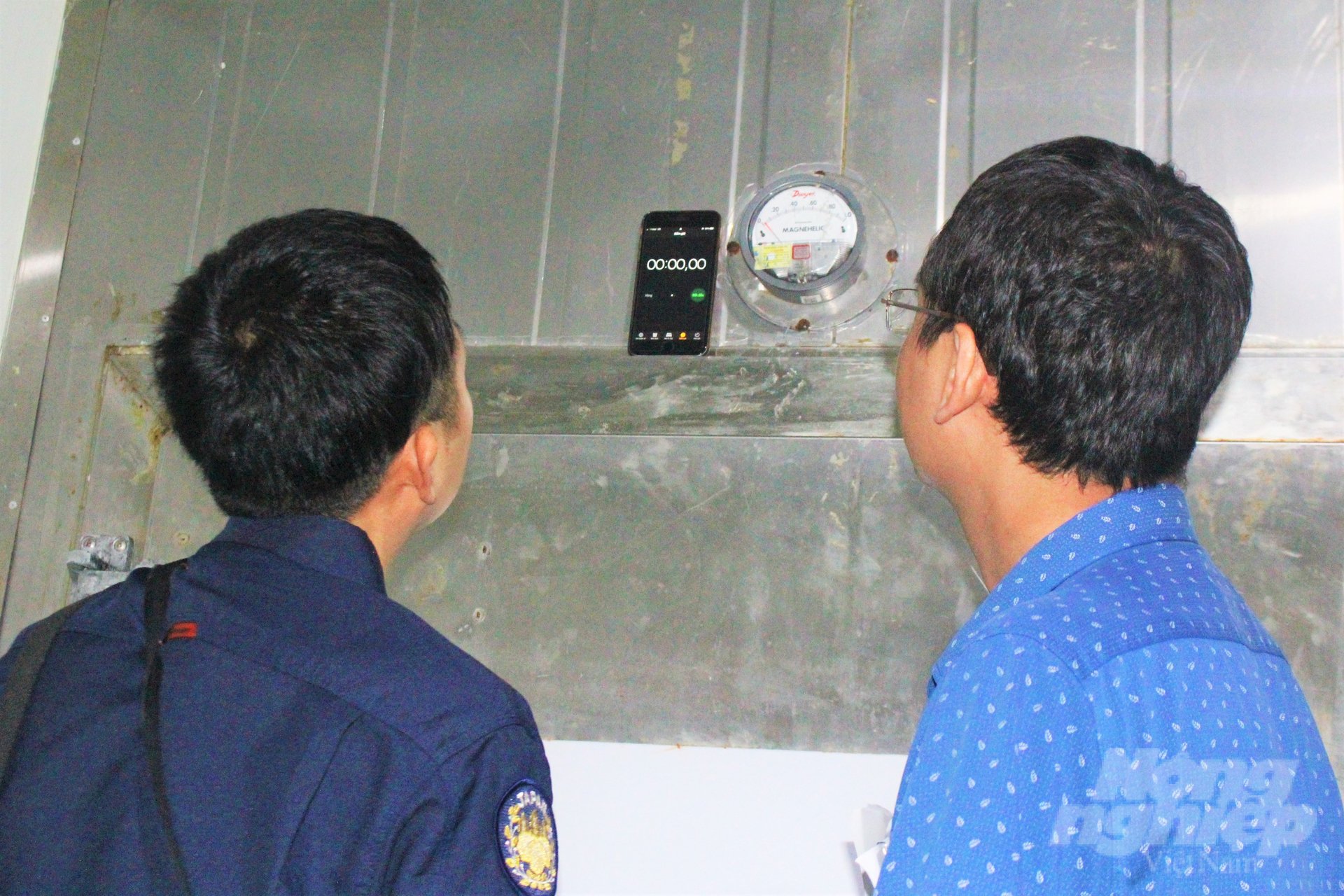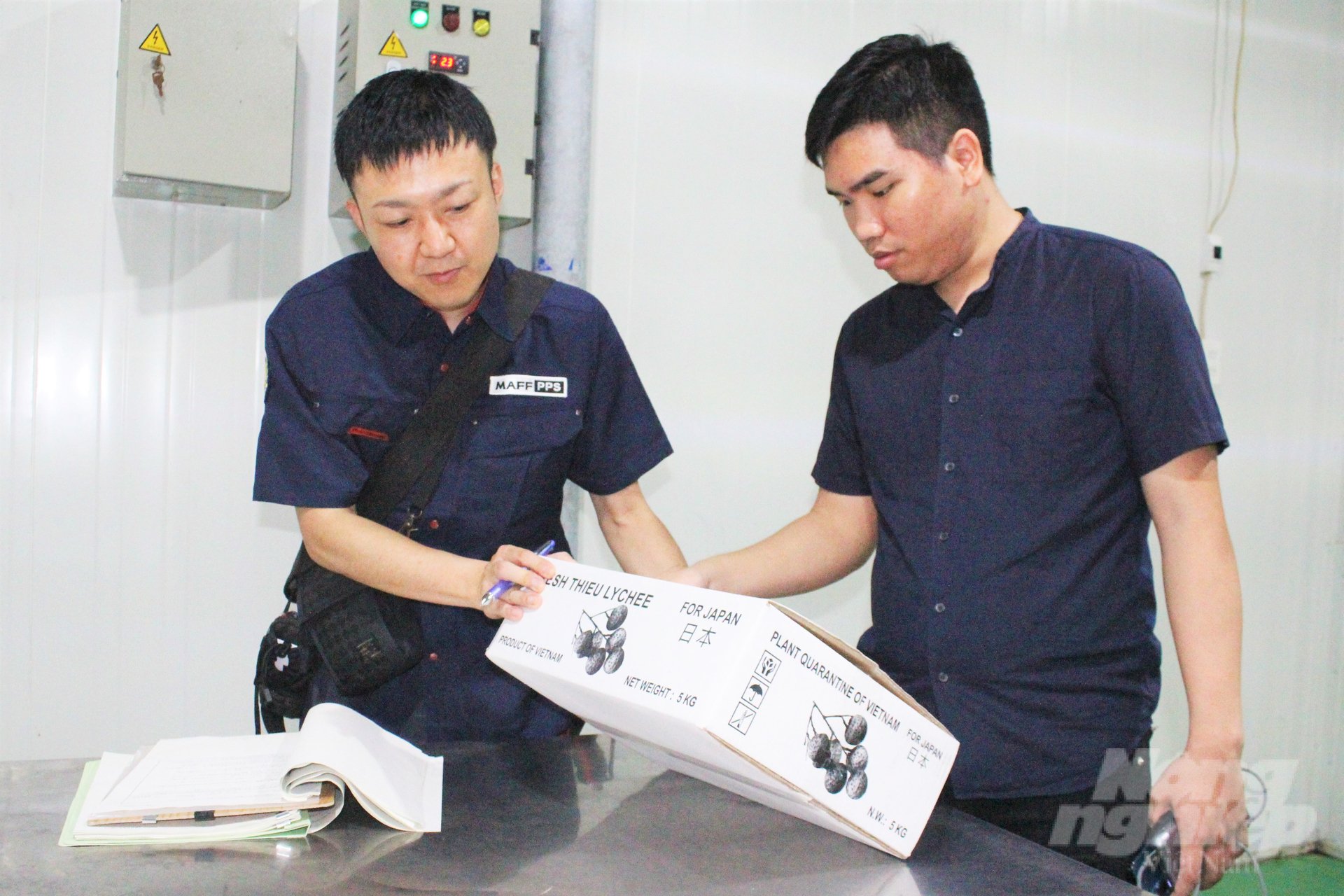November 26, 2025 | 01:30 GMT +7
November 26, 2025 | 01:30 GMT +7
Hotline: 0913.378.918
November 26, 2025 | 01:30 GMT +7
Hotline: 0913.378.918
On June 3, the Plant Protection Department (Ministry of Agriculture and Rural Development) coordinated with plant quarantine experts of Japan's Ministry of Agriculture, Forestry and Fisheries to inspect and evaluate the Methyl Bromide treatment systems for fresh lychees in service of export to Japan. The enterprises chosen for inspection include Red Dragon Service Trading Manufacture Co., Ltd., Ameii Vietnam JSC located in Thanh Ha district (Hai Duong) and Global Export and Import Foodstuff JSC in Phuong Son commune (Luc Ngan, Bac Giang). The inspection was conducted as per Japan's import quarantine regulations for Vietnam’s lychee.

The plant quarantine officer of the Plant Protection Department joins Japanese experts to inspect Vietnamese enterprises’ Methyl Bromide treatment systems of fresh lychee exported to Japan. Photo: Trung Quan.
evaluated the system of treatment chambers as well as the treatment equipment for the fruits. All indicators are carefully compared by Japanese experts with the detailed quarantine regulations that Japan officially announced in 2019.
At the end of the inspection, experts from Japan highly appreciated the participation of the Plant Protection Department and the thoughtful preparation of Vietnam's fresh lychee exporters since all the control indicators fully meet the standards prescribed by the Japanese side. All three processing facilities are recognized and can immediately process the fresh lychees exported to Japan as planned.
Mr. Le Son Ha, Head of Plant Quarantine Division (Plant Protection Department), said, “After a 2-year hiatus due to the impact of the Covid-19 pandemic, this year experts from Japan will directly visit Vietnam to check, evaluate and supervise the handling of each batch of fresh lychees exported to the Japan market. Only batches of lychee that are supervised by Japanese experts in coordination with Vietnam's plant quarantine officers and ensure Japan’s phytosanitary requirements are allowed to be exported”.

All indicators are thoroughly checked by Japanese experts as per regulations. Photo: Trung Quan.
The fact that experts from Japan came to inspect and supervise directly did not make Vietnamese enterprises feel pressured, because in recent years, under the guidance of the Plant Protection Department, these enterprises have gained a fair amount of experience and made careful preparation according to the standards set by the importing country.
On the other hand, Japanese experts coordinating with plant quarantine officers of the Plant Protection Department to inspect the processing, packaging and sealing process and the plant quarantine agency of Vietnam issuing the phytosanitary certificate right at the treatment facility will help fresh lychee shipments shorten the time of transportation and clearance at the border gate before entering the Japan market.

After the inspection, the Japanese expert recognized the processing system of fresh lychees exported to Japan of the three enterprises to fully meet the standards as prescribed. Photo: Trung Quan.
When the Japanese experts and the quarantine officer of the Plant Protection Department conduct direct inspection of the consignments, in case the experts show concerns or require further clarification of relevant contents, the staff of the Plant Protection Department can promptly explain, exchange and come to an agreement to create favorable conditions for exporting enterprises.
The direct inspection by Japanese experts at the production areas and processing facilities will create a "push" for Vietnamese farmers and businesses to raise their awareness in promoting lychee production in a safe direction. The ultimate goal is to create high quality lychees, not only for export to Japan but also to other markets such as Australia and the USA. Farmers will focus more on improving the value and competitiveness of Vietnamese lychees, thereby increasing their incomes.

The direct inspection by Japanese experts at the production areas and processing facilities will create a "push" for Vietnamese farmers and businesses. Photo: Trung Quan.
Thanks to the preparation at the beginning of the season this year and the shortened quarantine period at the border gates, the lychee output brought to Japan will be higher than last year. Currently, all businesses have received a lot of orders from this market, which is a good sign for Vietnam's fresh lychee industry.
But Japan is still a market with very high requirements for phytosanitary, product quality and food safety. Therefore, Vietnamese enterprises need to be well-prepared in terms of source of goods, closely following the standards set by the Japanese side, thereby step by step affirming the brand “Vietnamese lychee” in this strict market.
Translated by Samuel Pham
/2025/11/24/3536-2-112800_176.jpg)
(VAN) Dong Nai now has tens of thousands of hectares of forests certified for sustainable management, and this area will continue to be expanded in the coming period.

(VAN) Vinh Ha hamlet (Dai Xuyen commune, Hanoi) is shifting away from small-scale farming as households adopt bioscurity into their breeder chicken models.

(VAN) Heavy rains make aquatic species more vulnerable to disease. Proactive water management and high-tech systems help farmers prevent outbreaks and protect yields.

(VAN) Greenhouses are shifting production mindsets in Binh Lu commune, enabling farmers to ‘weather the sun and rain’ and secure stable vegetable harvests throughout the year.

(VAN) Green transition is crucial for the Mekong Delta amid climate change and stricter standards, offering a path toward sustainability.

(VAN) Dong Thap promotes agricultural restructuring, forms large specialized farming zones, raises the value of agricultural products and develops toward ecological and high-tech directions.
/2025/11/22/4018-4-213342_747.jpg)
(VAN) The Mekong Delta Agricultural Experts Club has attracted 143 experts and researchers to participate in providing consultancy and contributing initiatives to the development of one million hectares of high-quality rice.